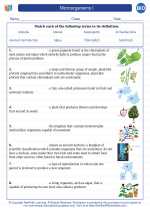Bioenergy
Bioenergy refers to the energy that is derived from biological sources, such as plants and organic materials. It is a renewable and sustainable form of energy that can be used for various purposes, including electricity generation, heating, and transportation.
Types of Bioenergy
There are several types of bioenergy, including:
- Biomass Energy: This involves the use of organic materials, such as wood, agricultural residues, and waste, to produce heat and electricity.
- Biogas: Biogas is produced through the anaerobic digestion of organic materials, such as animal manure, food waste, and sewage, and can be used for heating and electricity generation.
- Biofuels: Biofuels are liquid or gaseous fuels that are derived from biological sources, such as ethanol from corn or biodiesel from vegetable oils, and can be used as a substitute for traditional fossil fuels.
Importance of Bioenergy
Bioenergy is important for several reasons:
- It is a renewable and sustainable source of energy, which can help reduce reliance on fossil fuels and mitigate climate change.
- It can provide energy security by reducing dependence on imported fuels.
- It can contribute to rural development and create employment opportunities in the agriculture and forestry sectors.
- It can help in waste management by utilizing organic waste materials for energy production.
Environmental Considerations
While bioenergy has many benefits, there are also environmental considerations to take into account, such as land use, water use, and potential competition with food production. Sustainable bioenergy production requires careful management to minimize negative environmental impacts.
Study Guide
To study bioenergy, it is important to understand the following concepts:
- The different types of bioenergy and their production processes.
- The environmental and social impacts of bioenergy production.
- The potential for bioenergy to contribute to a sustainable energy future.
- The role of government policies and incentives in promoting bioenergy development.
It is also beneficial to stay updated on the latest research and developments in bioenergy technology and its applications in various sectors.
.◂Biology Worksheets and Study Guides High School. Microorganisms I

 Worksheet/Answer key
Worksheet/Answer key
 Worksheet/Answer key
Worksheet/Answer key
 Worksheet/Answer key
Worksheet/Answer key
 Vocabulary/Answer key
Vocabulary/Answer key
 Vocabulary/Answer key
Vocabulary/Answer key
 Vocabulary/Answer key
Vocabulary/Answer key
 Vocabulary/Answer key
Vocabulary/Answer key
 Vocabulary/Answer key
Vocabulary/Answer key
